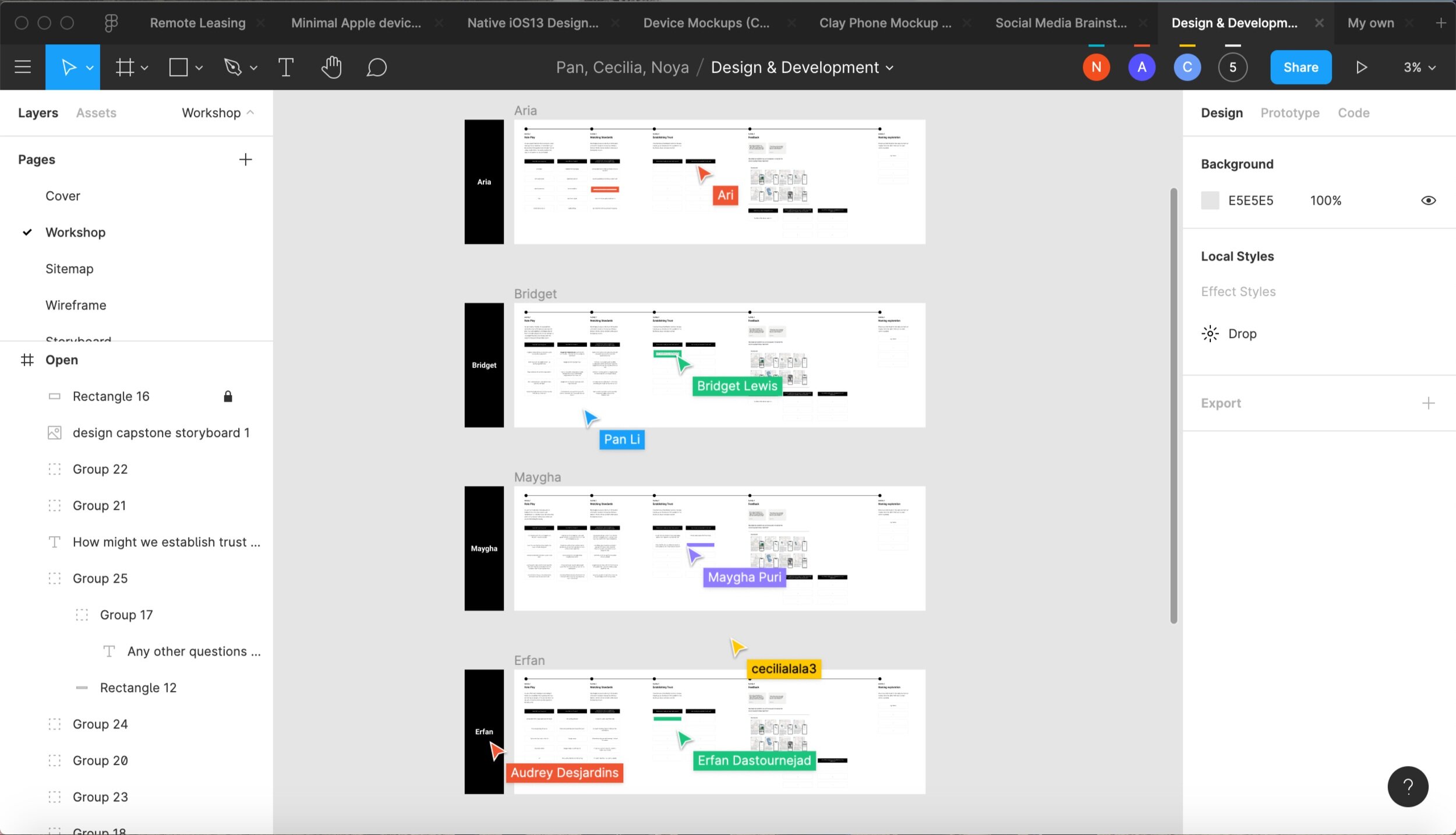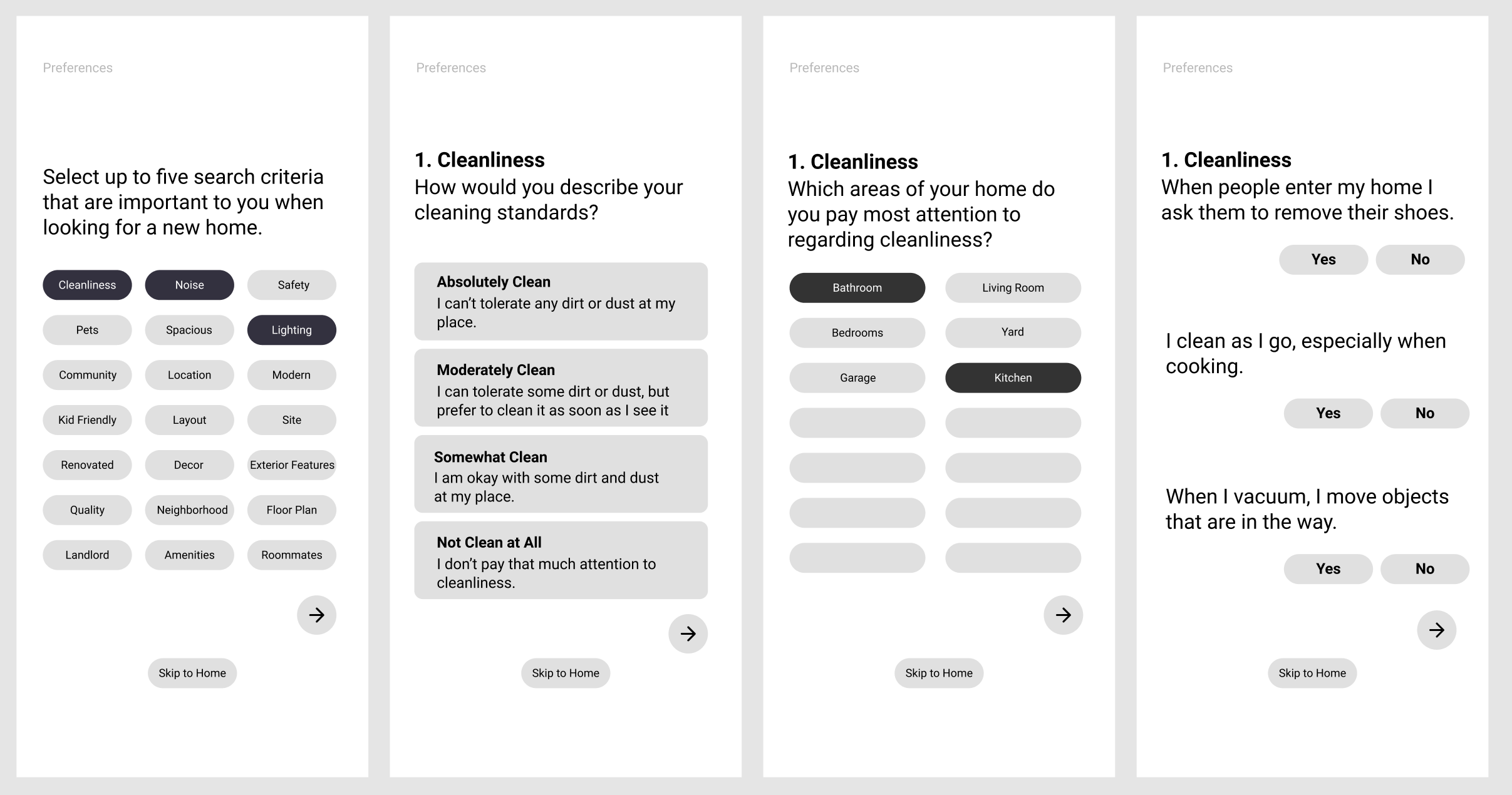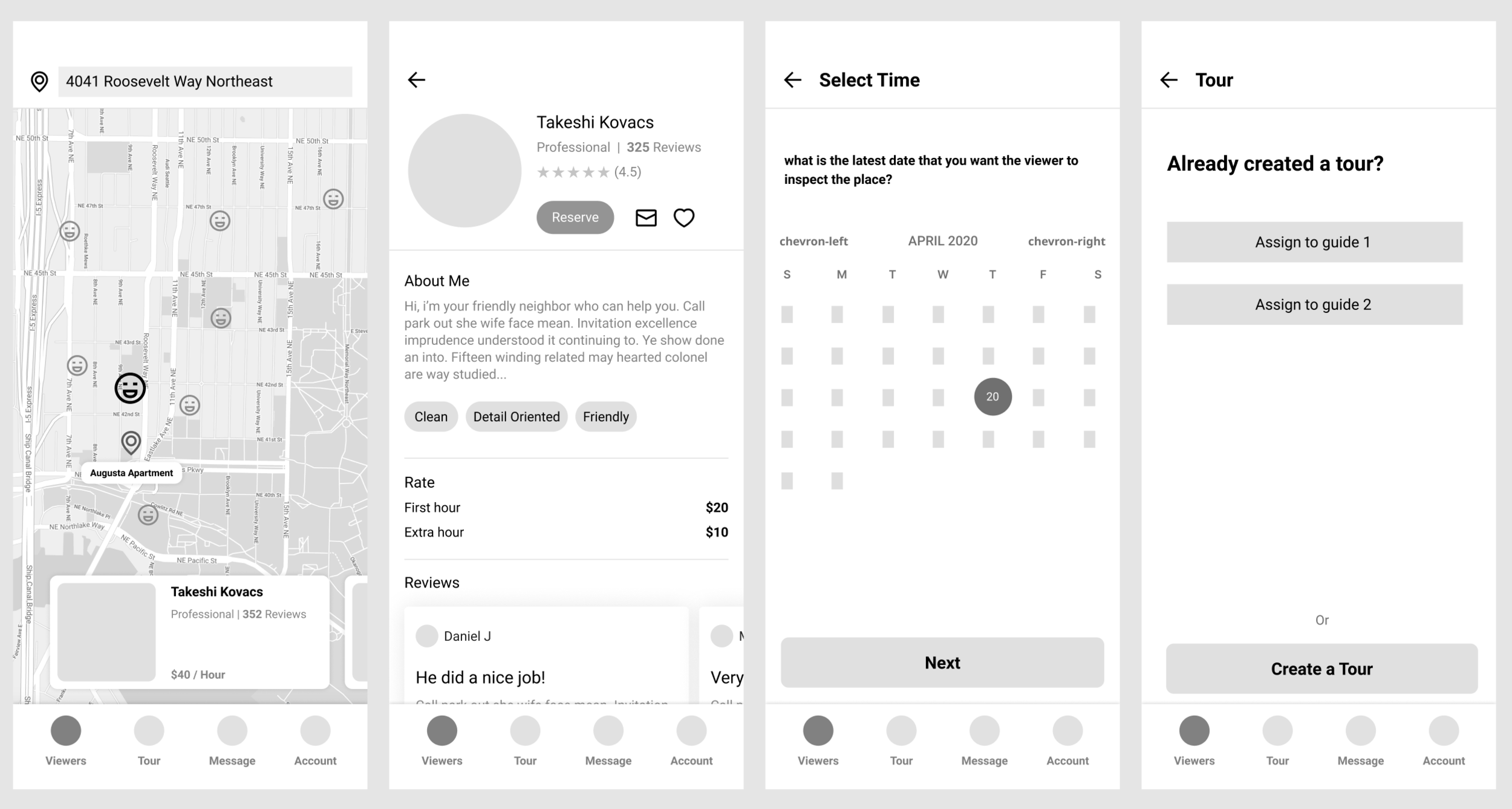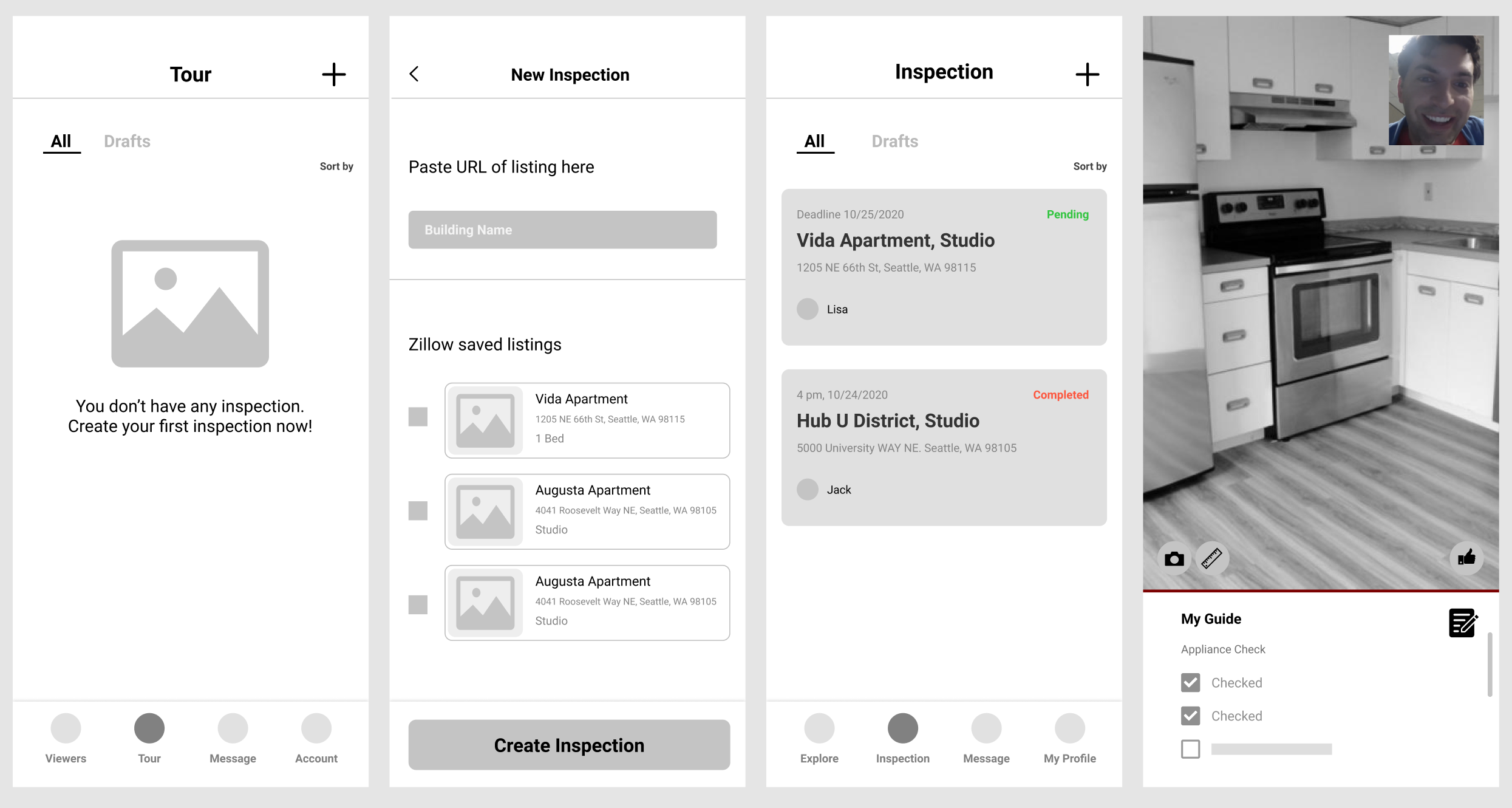
Vtour
Vtour
OVERVIEW
“Searching for a house locally is not without its difficulties. Add hundreds or even thousands of miles to the equation, and it becomes infinitely more complicated.” - Igor Nastaskin
House-hunting can be exciting yet challenging, especially during a world pandemic. Not being able to tour homes in-person brings renters a lot of stress and difficulties in making the right decisions. Our team came up with Vtour, a service that helps renters remotely connect with people in the area of their wanted listings in order for these people to tour the living spaces in-person and provide valuable information through a guided checklist made by the renter.
PROJECT DETAILS
Duration: 10 weeks
Team: Pan Li and Cecilia Zhao
Role: User research, data analysis, ideation, wireframing, user-flow, prototyping, usability testing, and project presentation
Tools: Figma, Principle, Zoom, Mirro, ProtoPie
Design Process
RESEARCH
Competitive Analysis

We analyzed 10 different competitors in the market in terms of their strengths and weaknesses as well as included features.
Findings:
Most current products mainly focus on searching for different listings and not so much on providing enough information for renters who aren’t able to tour the homes in-person.

Card Sorting Activity
Using Miro collaborative tool, we asked 6 participants to rank house-searching factors from most to least important. Our goal was to learn what are the main factors people consider when looking for housing.
Findings:
Some of these main factors including cleanliness and noise levels are hard to look for when house-hunting remotely.

Observation Analysis
We provided 6 participants with a scenario in order to better understand renters’ process when looking for housing from start to finish.
Findings:
There is not enough information provided to renters about the look and feel of different homes which creates a lack of transparency in the process and hard to make decisions.

Semi-Structured Interviews
We structured 45-minute interviews with 12 participants regarding their challenges and experiences when going through the house-hunting process remotely.
Findings:
Renters much prefer visiting the spaces in-person or at least have someone they can trust to go see them in order to help renters make valuable choices.
Research Synthesis


We analyzed and organized the data using the coding method and virtual sticky notes. We saw a lot of repetitive comments from our participants regarding the lack of trust during the remote house-hunting process as there are many factors that are hard to look for remotely.
Narrowing the problem space

After research synthesis, we found that the entire house-hunting process can be divided into four stages: Research, Tour, Compare, and Select. We realized the Tour stage brings up the most challenges and decided to narrow our scope to finding design solutions in order to help renters get a sense of what the home is like, even when being remote. Our hope for that was to help renters gain more trust in the process for them to choose their perfect living space.
RESEARCH QUESTION
“How might we enhance the house-hunting experience and help renters trust the process remotely?”
design principles
Transparent
Renters are able to receive true information about their wanted listings through an open and honest process.
Customized
Solution is modified to suit every renters’ needs and wants for their future homes.
Comprehensive
Design includes all aspects and factors in order to help renters in making the right decision for their needs.
Guided
Solution is streamlined and focused on delivering a complete experience from start to finish for all users.
Ideation
During the ideation stage, we each came up with 20 concepts. After talking through them, what they will require, and if they are feasible according to our timeline, we narrowed them down to three ideas.

Virtual Meeting Game
A virtual game where renters can get a sense of the neighborhood by creating their own avatar and walking around the neighborhood in the virtual world. Renters are then able to establish trust by seeing the neighborhood and connecting with neighbors who are also playing the game and have experience living in their desired location.

VR/AI Showroom
A showroom where renters are able to analyze a 3D model of their desired living space using a VR headset. The AI will then generate a report of the home performance based on the renter’s preferences entered during onboarding.

Guided Tour Platform
A platform for renters to connect with friends or other individuals who are located at their future home location to visit on their behalf. The platform also consists of a checklist to guide them through the tour and to look for the renter’s desires.
DECIDING ON A concept
Since we realized that the first two options can’t necessarily solve the issue of not getting the sense of feel of the home, we decided to go with our guided tour solution. We also took feasibility, viability, and desirability into consideration.
Our next step was to continue our research and to find out what are some of the main features we want to include in our solution that would best benefit the renter and will follow our design principles. We created an initial concept storyboard to convey our initial idea.

Initial Concept Storyboard used for Concept Development Workshop
Concept development workshop
After deciding on a concept we conducted a virtual workshop using Figma with 5 potential users to understand how they might feel about trusting a person they don’t know to tour a home for them. We provided each participant with a personality scenario to see how different people will respond to it.
Insights:
As a renter, it is important to know how long the viewer has lived in the area in order to trust their judgement regarding the place. We will include that in the viewers’ profile pages.
In order for renters to establish trust with finding the right viewer, adding some sort of a verification or ratings by people who know them to the profile page can also help.
Renters would feel like they can trust someone similar to them since they might have the same priorities and housing standards as them.
Instead of having renters manage the schedule for the tour, the viewer can do it as a part of their job so it is more efficient.
The renter should be able to interact with the viewer during the tour in order to provide feedback on viewing certain areas.

Low-Fidelity Sketches


Low-Fidelity Wireframes
Onboarding Experience
A matchmaking questionnaire to increase the likelihood of renters finding viewers they would best trust to inspect their future homes.
Usability Testing Insights:
Onboarding experience combined with the matchmaking questions is too long and doesn’t clearly introduce the real purpose of the app.
Matchmaking should be optional as a part of exploring viewers.
Some matchmaking questions are unnecessary to different users.
Inconsistencies in different modes of interactions for questions.

Finding/Scheduling with Viewer
Usability Testing Insights:
Location of viewer on a map is not necessary since users care more about their quality rather than location.
User flow is confusing for scheduling a tour.
Scheduling should be done by user requesting a preferred timeframe.

Creating an Inspection
Usability Testing Insights:
Linking listing accounts can be done during onboarding.
Not clear what “pending” means

Iterations
Changes to Matchmaking Questions
At the beginning, we wanted our questions to be specific to what is most important to renters when it comes to house-searching. We gave them a list of factors to choose from and let them answer a few questions about each to provide us with their standards. However, we came across the challenge of the survey being too long and overwhelming. Therefore, we simplified it by asking general questions regarding their lifestyle so we can best match them with a viewer who is similar to them.

Initial Matchmaking Iteration

Final Matchmaking Iteration
User Flow Simplifying
Our initial idea was to have a screen with a step by step process of creating a tour once landing on the home page. However, users expressed being overwhelmed with the amount of steps we are requiring of them. We decided to simplify the list by having a 3-step Wizard of Oz on the top of the page which also acts as a navigation bar.

Initial Flow Iteration

Final Flow Iteration
Final Design
Matchmaking Survey
A set of questions we ask both renters and viewers about their lifestyle preferences in order to match them with a local we call a “viewer”. We hope to help renters gain more confidence by letting a viewer who has similar preferences represent them when going on a tour.

Viewer Profile
Aside from general information, the viewer profile also includes reviews from other renters as well as their matchmaking survey answers in order to get a better understanding of the match percentage.

Personalized Checklist
A checklist that is automatically generated based on imported listings and answers from the survey. Renters are able to add and edit any criteria to make sure all their needs are delivered to the viewer.

Virtual Tour
During the day of the inspection, renters are able to join the tour remotely and go through their checklist with the viewer.

Overall Report
An overall performance report that the viewer sends to the renter after the tour is completed. The detailed checklist is attached including the viewer’s comments, photos, and videos.

